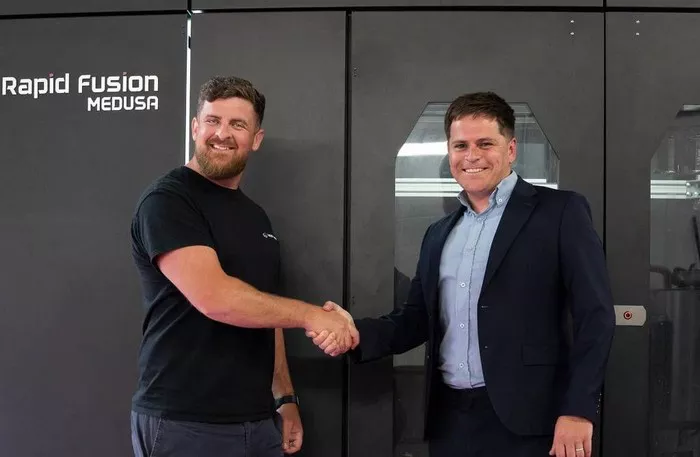In a landmark partnership set to reshape the UK’s advanced manufacturing landscape, Rapid Fusion and Applied Automation have agreed to co-develop Medusa — the country’s first large-format hybrid 3D printer. The new machine, scheduled for commercial release in early 2026, is projected to generate £5 million in sales in its first year and create up to ten new jobs.
The collaboration marks an expansion of a successful two-year relationship between the two South West-based firms. Under the new deal, Applied Automation will transform Rapid Fusion’s prototype into a fully production-ready system — a critical step that includes design for manufacture, supply chain development, and final assembly.
Production of Medusa will take place at Applied Automation’s Plymouth facility, where a dedicated assembly line and testing space are being created to streamline build times and accelerate market readiness.
“We’re excellent at developing disruptive technology, but not set up for scaled production,” said Martin Jewell, Chief Technical Officer at Rapid Fusion. “Applied Automation helps us close that gap. This partnership allows us to deliver Medusa at scale, faster and more efficiently.”
Jewell added that each Medusa unit will be assembled in just six weeks, supporting the company’s target of full shop-floor deployment by March 2026.
Innovation Backed by Government Support
Medusa has already secured a £1.2 million grant from Innovate UK, the national innovation agency. Its technical specifications offer substantial performance gains: three times faster operation than conventional systems, twice the accuracy, and 30% lower training and maintenance costs.
Built around a gantry-style frame, Medusa integrates three key tools into a single machine — a pellet extruder, filament feed, and CNC machining head. This hybrid approach enables the creation of large moulds and tooling commonly used in aerospace, automotive, marine, and construction industries.
AI and Motion Control at the Core
A major innovation lies in the integration of artificial intelligence and Siemens motion control technology, which allows for high-speed and high-precision operations. With a build volume of 1.2 m³ and movement speeds up to 1,200 mm per second, Medusa is tailored to meet the growing demands of high-throughput industrial users.
“The additive manufacturing sector needs scalable, hybrid solutions,” said Paul Rowe, Director of Automation at Applied Automation. “Medusa delivers exactly that — with cutting-edge capabilities that are designed for real-world industrial applications.”
Market Demand and Economic Impact
Industry interest is already strong, with potential buyers in sectors such as automotive, aerospace, medical, construction, and renewables. The machine’s modularity, speed, and hybrid tooling capabilities position it as a first-to-market solution in the growing field of robotic additive manufacturing.
If early forecasts hold, Medusa could become a flagship export for UK manufacturing innovation, strengthening the country’s position in the global Industry 4.0 landscape.
Related topics:

